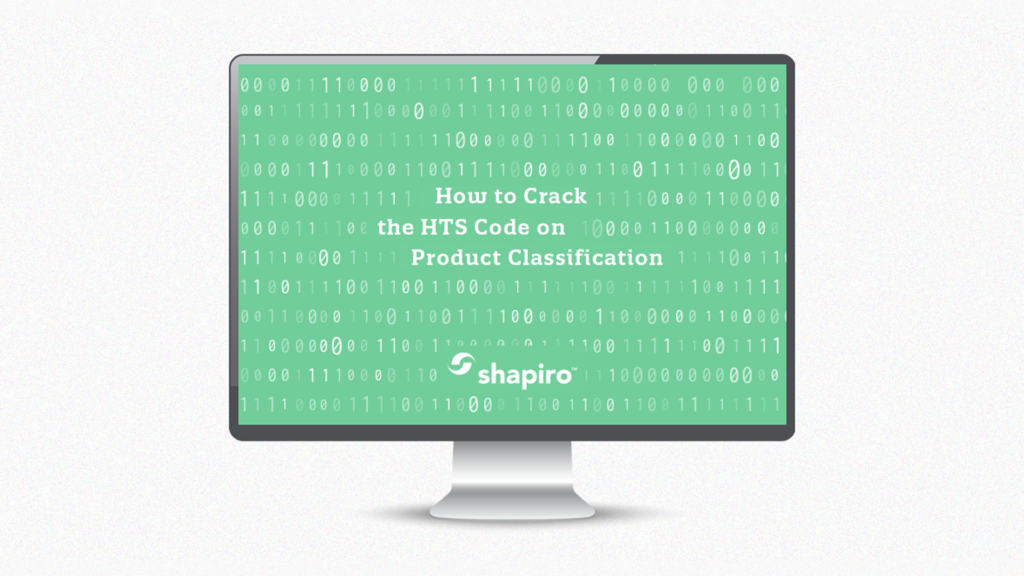Tariff Consulting Services
Navigating the complexities of tariffs and trade regulations can be daunting for logistics professionals, but Shapiro is here to simplify the process. Our comprehensive tariff consulting services are designed to help you minimize costs, ensure compliance, and uncover savings opportunities. From classification reviews to tariff engineering strategies, we provide actionable insights tailored to your business needs. Trust Shapiro to guide you through the intricate world of tariffs with expertise and precision.

Check Out What Our Customers Have to Say About Us:
Proactive Communications
At Shapiro, we understand that staying ahead of regulatory changes is critical to your business. That’s why we’re committed to keeping you informed and prepared for every update in the complex world of trade compliance.
Our team continuously monitors the Federal Register, new anti-dumping and countervailing duty investigations, additional PGA requirements, HTS updates, trade remedies, and exclusions. When changes arise, we ensure you’re the first to know.
The 301 Tariffs & Exclusion Processing
Whether you’re exploring the eligibility of exclusions or looking to claim refunds on past entries, Shapiro is here to make the process seamless and effective. We proactively analyze your transactions to identify entries eligible for exclusions. From gathering specification sheets and documentation to processing Post Summary Corrections (PSCs) or Protests, we handle it all. Remember, exclusions don’t always align directly with HTS codes—our expertise ensures no opportunity is overlooked.
The result? A stress-free path to duty refunds while we monitor the process through final liquidation.
Classification Advisories
Importers must use “reasonable care” (a legal term!) in the classification and entry of their merchandise. Shapiro’s experienced compliance consulting professionals help you navigate through the complexities of merchandise classification. We gather products’ material composition, image and function, the General Rules of Interpretation (GRIs); and we review any relevant Customs rulings, explanatory notes and/or court cases as applicable to assign the correct classification. Whether you have five items to be reviewed or 500, we are here to help. We do recommend that all classifications be reviewed periodically to ensure you are current with regulatory changes, new rulings, provision changes, HTS changes, etc.
We offer several different classification services:
- A la carte: You identify a list of products that need to be classified and/or evaluated, and we review them individually.
- Complete Catalogue Review: We evaluate a complete catalogue or database of products along with the current HTS being used. We then indicate whether we agree with the current classification and provide well supported reasoning. As part of your reasonable care responsibilities, we make certain to document and maintain the reasoning for each classification. This thorough exercise accomplishes that lofty goal.
- Classification Advisory Module (CAM): For customers with fewer than 50 items, our Classification Advisory Module (CAM) is a great solution. CAM is a portal that captures all relevant information about a product, such as country of origin, product composition, uploaded specifications (if available), and how the item is marketed. Our team of licensed Customs brokers then reviews the information and, if any clarification is necessary, communicates with you via this repository. Our goal is to evaluate your products for classification and admissibility proactively, well in advance of shipment arrival. The best of both worlds: the convenience of digital, supported by “brainial!”
Deeper Dive Classification Analysis: Tariff Engineering
Tariff engineering is becoming increasingly relevant as new US tariffs are proposed or heightened on various Chinese imports (for example). This strategy involves designing or modifying products, often by altering components or assembly processes, to reduce the duty rate by reclassifying the products under different tariff categories. Imagine a product is assembled in a specific way or includes easily substituted materials; it could potentially be classified under a tariff code with a lower rate or under a completely exempt category. Or, a modest product modification may be the right path. We will strategically review your products and provide solid recommendations for exacting classifications and/or product re-designs that may result in more favorable duty treatment.
Binding Ruling Services: Classification and Country of Origin
Have you been in a situation when you were uncertain of an HTS classification, of country of origin, or if your products qualify under a specific trade agreement? A binding ruling may be a good option for you—and we can help!
Binding rulings are authoritative decisions issued by US Customs (CBP) that clarify the classification, country of origin, or applicability of trade-related regulations for specific goods. These rulings provide importers with legal certainty regarding the duties, taxes, or other requirements for their products before they enter the United States. Once issued, a ruling binds both CBP and the importer, ensuring consistent treatment of the product across all US ports of entry, which helps prevent costly disputes and delays. Our services include preparation of your argument, submission of the ruling request, and steady follow-up.
Request for Information (CF28) & Notice of Action (CF29) Review
Customs Forms 28 and 29 are critical communication tools used by US Customs to address potential concerns with imported goods. The CF28 is typically issued when CBP seeks clarification on an importer’s declarations, classification, valuation, or compliance with various regulations. Receiving a CF28 does not necessarily indicate a violation but suggests CBP requires more details to ensure accuracy and compliance.
In contrast, a CF29 signals a more serious concern. It informs the importer of an intended action or an action already taken, such as a rate advance, tariff reclassification, or penalty imposition due to noncompliance. Together, these forms are often early indicators of heightened scrutiny from CBP and can highlight areas where an importer’s practices may require adjustments to avoid future penalties or shipment delays. These notices should be taken as seriously as receiving “mixed news” from your doctor!
Serious only begins to describe Shapiro’s process for CF28s and CF29s! If we receive the forms, they are logged, investigated, and followed to resolution. Typically, our customers need only notify us to provide CF28 clarifications or CF29 remediation consulting.
Deeper Dive, Admissibility Reviews: PGA & ADD/CVD Analysis
In addition to deep classification analysis, Shapiro conducts admissibility reviews by crosschecking for PGA flags and ADD/CVD flags.
PGA In-depth Research: Participating Government Agency (PGA) requirements have become extremely (exceedingly?) complex. If you face a challenge, please reach out to us. We are more than qualified to assist in evaluating your product or product base to ensure compliance with PGA regulatory requirements.
ADD/CVD In-depth Scope Review: Antidumping (AD) and countervailing duties (CVD) are trade remedies applied to protect domestic industries from unfair competition due to foreign goods being sold below fair market value (dumping) or benefiting from government subsidies (countervailing). When evidence suggests that foreign goods are priced to harm US industries or benefit from subsidies, the International Trade Administration (ITA) and the US International Trade Commission (ITC) conduct investigations. If findings are affirmative, the ITA issues AD/CVD orders instructing U.S. Customs and Border Protection to collect duties on those goods.
As of early 2024, the US has enacted over 600 AD and CVD orders, with a significant number of active investigations across dozens of varied industry verticals. These actions are regularly reviewed to assess their continued relevance and impact on US industries. Enforcement is ongoing, with regular administrative, sunset, and circumvention reviews conducted by the ITA and ITC to adjust or terminate orders as needed. Shapiro is constantly monitoring new cases as they arise and is more than able and willing to assist in evaluating your product against AD/CVD scope reviews, both current and proposed.
Import/Export Process Review
Are you interested in ensuring that your import and export process is comprehensive and compliant? Allow us to help! Shapiro’s import and export process reviews examine the sufficiency of recordkeeping and the adequacy of internal controls maintained by the shipper over its Customs activities. The review is intended to identify and reduce risk and to offer suggestions, where needed, further demonstrating a commitment to import compliance.
How to Crack the HTS Code on Product Classifications
Want to learn more about product classification and HTS codes? Look no further! In this blog, we run through the basics of HTS codes, tariff engineering, product classification, and more!


